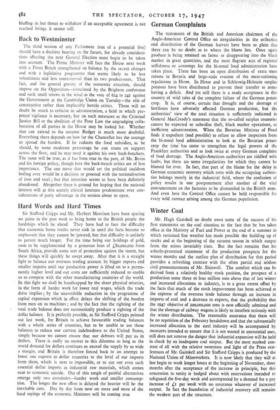Hard Words and Hard Times
Sir Stafford Cripps and Mr. Herbert Morrison have been sparing no pains in the past week to bring home to the British people the hardships which lie ahead. They have had to face the difficulty that economic home truths never sink in until the facts become so unpleasant that they cannot be ignored, but that difficulty is unlikely to persist much longer. For the time being our holdings of gold, soon to be supplemented by a generous loan of L80,000,000 from South Africa, provide some sort of protection against the storm, but these things will quickly be swept away. After that it is a straight fight to balance our overseas trading account by bigger exports and smaller imports until our productive power is lifted on to a perma- nently higher level and our costs are sufficiently reduced to enable us to compete with the other manufacturing countries of the world. In this fight we shall be handicapped by the sheer physical miseries, in the form of harder work for lower real wages, which the trade drive implies ; by the unavoidable reduction in the programme of capital expansion which in effect delays the shifting of the burden from men on to machines ; and by the fact that the righting of the total trade balance does not automatically produce a righting of the dollar balance. It is perfectly possible, as Sir Stafford Cripps pointed out last week, for Britain to achieve favourable trading balances with a whole series of countries, but to be unable to use those balances to reduce our current indebtedness to the United States, simply because we cannot ensure that our debtors will pay us in dollars. There is really no answer to this dilemma so long as the world demand for dollars continues to exceed the supply by so wide a margin, and Britain is therefore forced back to an attempt to boost our exports to dollar countries to the level of our imports from them, which is next to impossible, or to cut out even such essential dollar imports as industrial raw materials, which comes near to economic suicide. Out of this tangle of painful alternatives emerge only two certainties—harder work and smaller consump- tion. The longer the new effort is delayed the heavier will be the inevitable cuts. Day by day from now on more and more of the hard sayings of the economic Ministers will be coming true


































 Previous page
Previous page